Daily Maverick 168
Adopting new lives in which democracy is closer to a verb than a noun
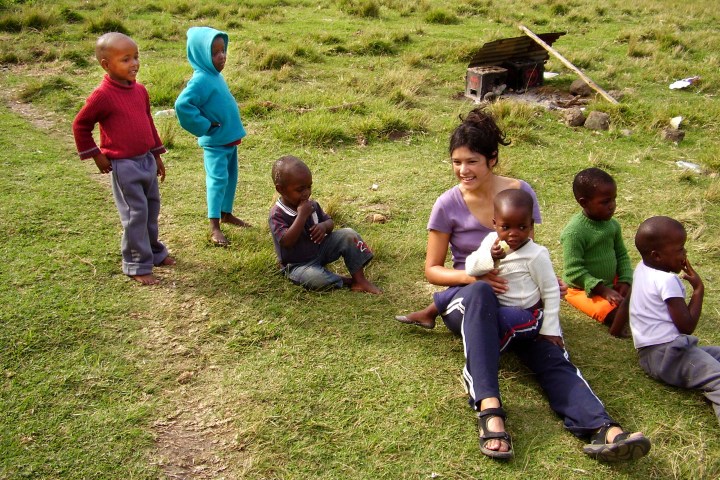
The state of our economy, our country and our personal lives have been bludgeoned by craven greed, corruption, crime and the coronavirus. This state of affairs is enough to drive us all to despair, but here are three extraordinary ordinary women, from three different corners of South Africa, who show us that there is a way that each one of us can play our parts to make a difference.
First published in DM168
Rejane Woodroffe: Climbing a mountain starts with the first step – and takes a lot of moxie
By Ufrieda Ho
When Rejane Woodroffe (main photo) swapped her cappuccino lifestyle in Cape Town for life in deep rural Eastern Cape (without flush toilets or electricity), it wasn’t about going off grid; it was with the deliberate intention of staying plugged in.
Staying plugged in for the former economist meant not looking away from entrenched poverty and the impact of decades of neglect in Bulungula village in the Mbhashe municipality. It ranks among the three poorest areas in South Africa, according to recent census data.
Staying plugged in has made long-term action possible. Tangible solutions and interventions have changed lives and literally saved lives. It came together in the form of the Bulungula Incubator, a non-profit she co-founded with her husband, Dave Martin, in 2007 with the mission to end poverty in a generation.
“In 2004, I had met Dave, who had been building the Bulungula Lodge [an ecobackpackers that since 2014 has been 100% community-owned]. I was falling in love with him and with the Wild Coast. But at the time we were also hearing that a third of the babies born in the district were dying from diarrhoea because there was no access to running water, no sanitation and no clinics,” says Woodroffe.
She was at a personal crossroads too, having clocked up 10 years in investment banking and asset management working between Cape Town and Sandton. She was also newly back in South Africa, after taking up a scholarship to do a master’s degree in development economics at the University of Sussex in the UK. Another plum job offer in corporate finance was also luring her back to the city. All of these were a million realities removed from going to funerals for babies.
“When you’re burying babies of families you know, you have to do something; anyone would,” says Woodroffe.
Choosing not to look away and to contribute with personal discomfort takes a certain kind of steel, also heart. Hatching a plan for an incubator project where there were no drivable roads or infrastructure and a slim chance in hell of success, however, took inspired madness, and moxie.
“In retrospect, it seemed like the obvious decision to make, but at the time I did struggle. It was a hard decision, especially when you’re young and the whole world is telling you you can’t step away from a great career and a good life,” she says.
Woodroffe, though, isn’t given to throwing up her hands in despair or navel-gazing. Getting on with the fight, even the seemingly impossible, comes from growing up classified as coloured on the Cape Flats.
She grew up with the bitter burden of knowing her parents and older brothers had been forced from their home in District Six in the late 1960s.
It made student politics at UCT, where she completed a Business Science degree, her way to fight against an unjust regime. As a schoolgirl, she joined marches and took leadership roles in student organisations affiliated to the United Democratic Front. It was the time when organisations such as the Congress of South African Students were banned. Running from apartheid policemen’s sjamboks and experiencing the terror of friends being thrown into prison was a nightmare that was also the norm.
She also remembers her “baptism of purple rain”. It was the second day of spring in September 1989 that anti-apartheid protesters marched on Parliament. Protesters were tear-gassed and blasted with water cannon filled with water that had been dyed purple.
The Purple Rain March was an iconic moment of protest, but ultimately just one of many actions needed to chip away at apartheid. Woodroffe mulled this over to find personal courage to take the next step towards the unknown of setting up the incubator.
She admits that she was grappling with disillusionment too. The golden moment of democracy turned out to be glitter for millions of South Africans. Ten years on, in 2004, democracy had lost that glint. Eventually, she realised democracy wasn’t a dud, but rather that not enough people were keeping it burnished.
So, she said no thanks to the job offer in Cape Town, ignored the detractors and the doomsayers, and moved permanently to Bulungula. She and Martin married in the village and set up life in their own hut. Solar panels, water harvesting, food gardens and compost toilets would come, and they’ve rolled these out across the village.
Woodroffe worked off her outsider label quickly. It was by being a neighbour, a learner and a friend. She was, however, unapologetic about the skills, privilege and resources she could share.
Her education and world experience remain valuable in creating a bridge between funders, supporters and government. For her community, it is recognition of their potential and knowing they have one of their own to speak for them.
“It’s that three-legged pot of government, private funders and communities coming together to each play their role,” she says.
Woodroffe says with a laugh that it’s helped that she has developed a thick skin over the years. That thick skin though is really reflexivity and insight; it’s also trust that these always trump angst and hang-ups.
“There’s a lesson in not being so worried about what you think people think of you. We make all these assumptions; we think people consider us outsiders because we are not from here; or that because you’re a woman you’re stupid; or you’re not white so you must be uneducated.
“Making assumptions about what people think is a waste of time. I tend to focus on what I am thinking about, and examining that. That’s how I find what’s right in my heart and the path I need to follow,” she says.
Fast forward nearly 15 years and the incubator has grown into her vision. The programmes support pregnant women and incorporate home-based care services. There are five preschools, a high school academy, and a programme for career development and training. They have 125 people on the payroll; the village is full of thriving food gardens; parents volunteer on a roster system to cook meals at their children’s schools.
There’s an e-learning programme in the academy; their radio station boasts a growing listenership; and volunteers from around the world keep arriving.
Visitors bring a range of skills, from academic teaching and giving yoga classes to starting a legal resource centre.
That the incubator is located in an achingly beautiful part of the world helps. But people are drawn to the idea of a project focused on the many elements it takes to build a human being. The philosophy of paying it forward applies, as does truly seeing each other and, of course, there’s a nod to good ol’ effort and hard work. There’s acceptance that democracy should be closer to being a verb than a noun.
Woodroffe remains director of the project. Her salary, though, is smaller than the teachers’ and senior programme managers’ in the project. It’s her and Martin’s idea of taking just what they need in recalibrating their idea of a good life.
“Once every five years, I do step aside. We go backpacking for a year to another developing country. It’s a break, but it also means we can see solutions from other places that may work in Bulungula.
“The trips also build leadership and resilience at the incubator,” she says.
In their absence, the people Woodroffe has trained find their feet, devise their own solutions and work towards Woodroffe’s ultimate goal of working herself out of the position of director.
And when that day comes, it won’t be so that she and Martin can head back to the city. They’re not going anywhere. Bulungula is home and it’s exactly where they belong.
Nontando Zintle Ngamlana: Making unseen people visible
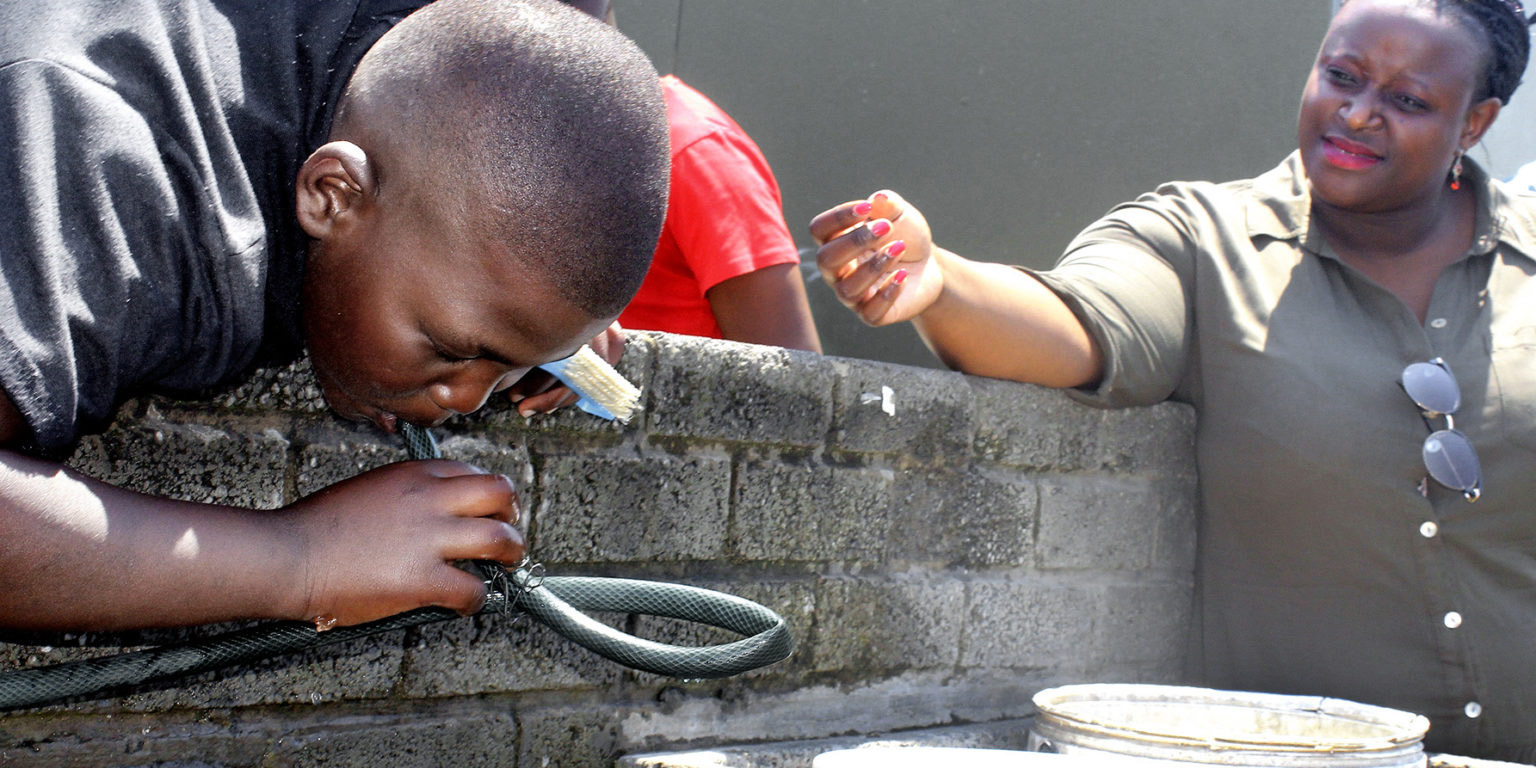
Nontando Ngamlana meets residents of Polar Pack informal settlement in East London who had complained about taps. (Photo: Hoseya Jubase)
By Estelle Ellis
Recognising early that she had been born with a sense of justice and the courage to fight for those ignored by those in power, Nontando Zintle Ngamlana, the executive director of Afesis Corplan, an NGO working to strengthen community involvement in local government and human settlements, is on a mission to amplify the voices of those who are not heard.
“I was born and raised in Peddie in the Eastern Cape, 80km outside East London. I did not leave the village until I matriculated. I had politically conscious parents and from a young age I was made aware of the political culture at the time. We were very alive to the struggle, in our household,” Ngamlana said.
Now 40, Ngamlana remembers her father being incarcerated for his political activities.
“Even pre-1994 I remember very well how it impacted on our household when my father was not there. His friends and colleagues were always around. The conversations around our house were of a radical political nature. But, this being the rural Eastern Cape, the place of a woman was also with her husband. My family was quite radical in that they said we must step out of the norms imposed on women by society. I grew up in a very conservative society, but with very liberal parents.
“But, since I can recall, I had this quality that social injustice always irked me. I have to respond to it whenever it raises its head. After matric, I went to do a degree in mathematics. I had a gift for maths. In my village, most women were nurses or teachers. Most professionals actually were nurses or teachers. On the odd occasion you would find an uncle who was a lawyer and that one would really be celebrated as the odd one out.
“I wasn’t sure what to study,” she adds. “I just knew I didn’t want it to be nursing or teaching. My grades were good. When I got to Nelson Mandela University they put me in the BSc queue. I was a rural girl who never touched a computer. I didn’t know anything about zoology so I thought computer science sounded interesting. But there was a line for mathematics that did not have a lot of black students standing there. I went to stand in that line. I wanted to be the black face among the white people.”
Ngamlana graduated with a BSc degree in applied mathematics and statistics.
“For three years there were only one or two of us in the mathematics classes. I then decided I wanted to go into engineering. I pursued an honours degree because I hadn’t yet figured out what to do with it. My degree was in statistics. I realised that I did not enjoy drawing or engineering and structures.
“After university, I went to work for an organisation, the Urban Services Group, based in Port Elizabeth, that was a branch of the Urban Foundation. They were central in overseeing the transition of local government to a democratic municipal structure.
“I worked with many politically conscious people and we worked hard to have the Section 27 rights to water, health and education realised. I think my time here launched the woman who I have become since then.”
After varsity and a government job, she realised she had had enough.
“My father had done some work with Afesis Corplan back in the day. There wasn’t a position available to me at the time, but I packed up all my belongings and went home.”
She pursued a master’s and an MBA and 16 years ago started a volunteer job with Afesis Corplan and has risen to executive director. “We want to strengthen local government. In its design, it is the only sphere of government where people are central. We must build the skills and find the calibre of people necessary where citizens can engage with local government. Local government is the most chaotic of all the spheres of government … my job grapples with all these things. I have this inborn sense of justice. My children would say: ‘Our mother would find something to fight with someone about’. I want to raise my children, they are nine and 11 now, in a socially just world where their gender would not determine their outcome.
“Local government should be professionalised and strengthened, even if it is through a deployment process. But the people who are deployed must be technically capable and competent people who are appointed to the right position. The second intervention that I think would be key to fixing local government is to insulate the procurement process by making it open and transparent.
“With Covid-19 we saw rampant corruption and looting of resources, but managed to get it published in the public domain. The same openness is necessary for local government procurement. It is a way for the general public to become the ombudsman and [hold] the political parties to account. Investigating bodies and the media must be allowed to ask the right questions. That is very necessary. We are assuming that the law will lead to the establishment of a culture of good governance – but that doesn’t happen by itself.”
The complex legislative framework of local government made it easy not to comply. “We must push for greater access to information on tenders. We are talking about public funds … This information should be in the public domain. I think we should strengthen oversight at a local government level. There are very simple things that we can do. We want inclusive planning,” she said.
“Communities feel that they are not being seen. I find that most communication departments at local government level have been reduced to event planners. The communication from local governments is very poor and feedback is even worse. If the mayor comes to a public gathering, people will share their frustrations. Then the mayor goes away, promising to do something, but never returns,” said Ngamlana.
“People are left to their own devices. Sometimes frustration brings our communities to a boiling point. Protesting has become a culture. People must understand that protests are not the first prize for a community. It takes a lot of energy and if it doesn’t work the credibility of leaders suffers. If a community engages in a protest it means that they have exhausted all other avenues. We need to make people feel seen and heard.
“Sadly, local government does not have these mechanisms. I wrote a paper in 2018 looking at the skills necessary for local government to communicate properly.
“Some municipalities have websites that are so technical and complex. You would expect them to package information in a simple way, to make an integrated development plan simpler to understand and package it in infographics. That for me would be the function of the communication department. To communicate in a way to empower.
“I share the heartbreak of communities in crisis. These issues we deal with are intensely personal. I grew up in a rural village. I know that life. I know about fetching water. When we talk about men and women … I know what it means for a girl to grow up in that context and what they are missing out on. I bring all of me into my work. I have learnt along the way how to destress – when I get home – I am still a mother. Because of its nature, my work is emotionally very draining. It is hard work. I cannot bring it home all the time. I have learnt to compartmentalise my work. When I pull up in the driveway I step into my mommy box and I am fully present for my family. It helps me cope.
“I surround myself with critical thinkers and reflectors. I find those conversations fruitful. On those odd days that I see the glass half empty, they help me see that it is actually half full. My network helps me to find all sides of a matter,” Ngamlana said.
“We still are observing what happens in the local government space. As much as people are angry and frustrated and don’t have water, they will again go and vote the same party into power and hope for a different result. The reality is that there are fears that they will lose social benefits and the child support grant if they do not.
“We are on a journey of trying to understand this at a psychological level. [The ANC] is a liberating party and they are hanging on to that. People vote for hope, not for a party. They believe that the party will respond to their hopes. Hope has a lot to do with it, as does our own journey as individuals and families,” she said.
Referring to the violence inflicted on protesters by the police in the Eastern Cape over the past few months, Ngamlana said police had been confronted with something they never thought they would have to deal with.
“We are still learning. I don’t think we ever thought that we would have to work in the police space. But we are confronted with an ill-capacitated SAPS who respond with violence, even in non-violent protests. There is something in the psyche of the police that we must come to understand.”
She said they had had engagements with the SANDF during lockdown. “It was as if we were engaging a vigilante group. I never thought we would have to engage about the behaviour of the defence force. I don’t think we will see changes in local government because of internal processes. I think it will be an external process and we are going to see the rise of social movements. We are seeing the shift in keeping government accountable; people were organising during lockdown. They are connecting electronically and doing things in the social media space. It would be interesting to see government’s response, if there is going to be a clampdown in the technology and media space …
“If I can change one thing today … it would be to provide wide access to information. I would make all information on public resources accessible and available. I would open the tap and let people use the information in creative ways to hold government accountable. The veil of secrecy is a breeding ground for corruption, nefarious activities and a lack of oversight. It is something that seems so obvious, but we don’t get it right,” Ngamlana said. “I am contributing to something bigger than I am. It has morphed into a calling,” Ngamlana said.
Joanie Fredericks: From driving forklift trucks to fighting for food
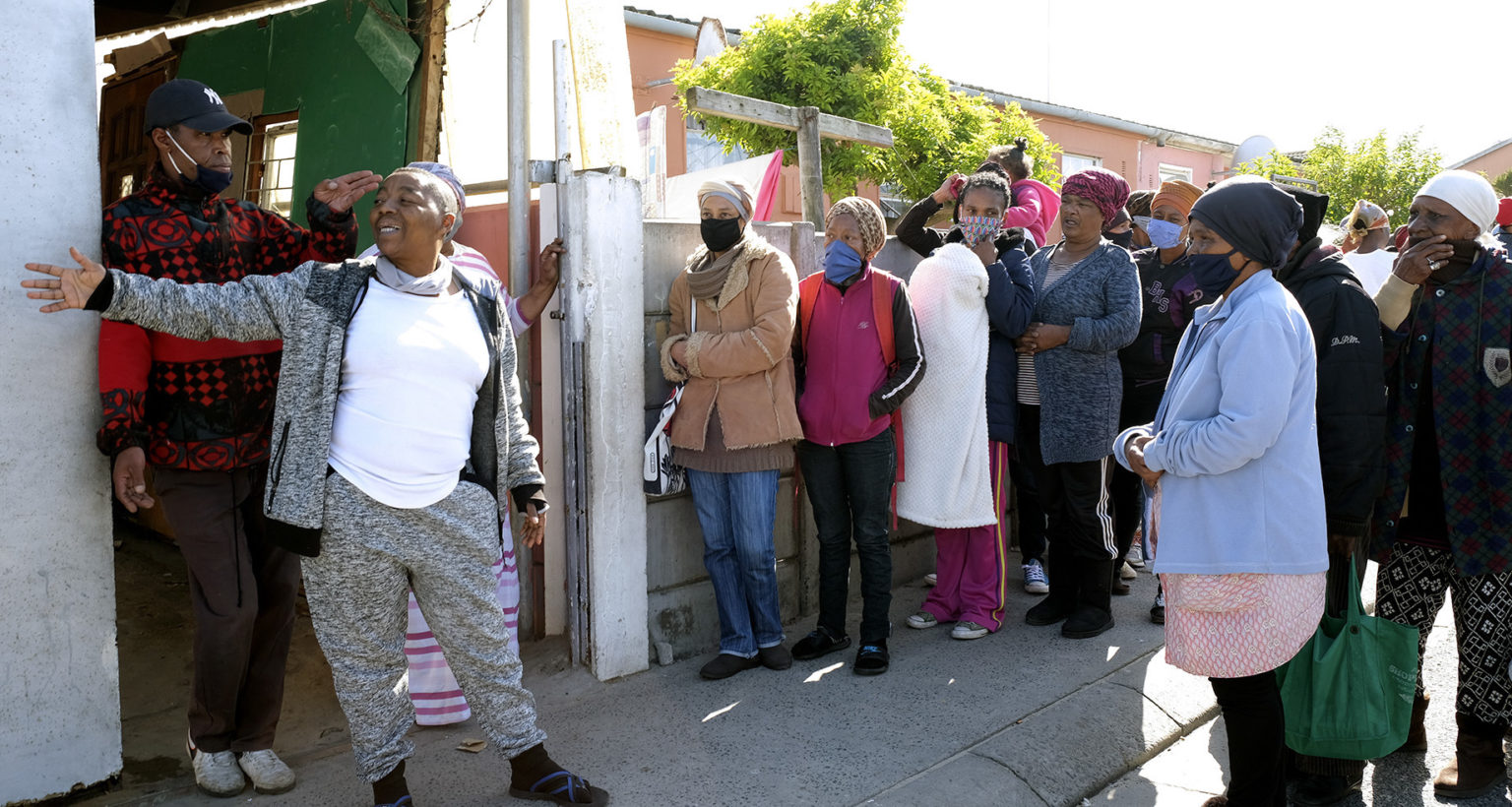
Joanie Fredericks speaks to community members from her home in Mitchell’s Plain, Cape Town. (Photo: Daniel Steyn)
By Biénne Huisman
At the age of 28, Joanie Fredericks cooked Osso Buco for prime ministers and dignitaries at fine dining restaurant Meseret Keren, in Tel Aviv.
She was in Israel taking a break from labour in the apple farming valley of Grabouw, where she grew up to become one of the Western Cape’s first female forklift drivers.
“Israel, I’m telling you it’s supposed to be the Holy Land, but I’ve never seen people smoke so much dagga,” says Fredericks, speaking to Maverick Citizen over Zoom. The 51-year-old activist’s recollections are alive with mischief and humour, despite the hardships that have shaped her.
Today, she feeds 10,000 people on the Cape Flats every day. Of these, 500 meals are prepared at her home in Tafelsig, Mitchells Plain, where families queue from 6am. Whether feeding prime ministers or the poor, Fredericks goes full throttle. Describing herself as “full of fire” and “full of shit”, she is intent on taking President Cyril Ramaphosa to court for rampant hunger under lockdown as Covid-19 funds were looted.
To this end she has joined the Right To Food Campaign: “So we are a range of activists, academics and lawyers, looking at different strategies. You can rest assured I will not give up on my commitment to take the president to court. Our last strategy meeting was two weeks ago.”
Fredericks sits in a sun-washed courtyard in a wide white chair. Potted plants brush against a turquoise wall. She founded the Tafelsig Mitchells Plain Community Action Network at the start of lockdown Level 5; and with her “Change Champions”, prepares food at 20 feeding stations every day.
“Come, let me show you the kitchen,” she says, aiming her Zoom camera. Under an awning, next to three large cast iron pots, a woman peels carrots. “That is our cook, Auntie Nadeemah. She is just so good. Nadeemah, come here please. What are we eating today?” Nadeemah smiles shyly. “Carrot food. Carrots, peas, potatoes and rice.”
Supplies are donated. Benefactors include Shoprite and Ladles of Love. Funds from Cape Town mayor Dan Plato are used to buy cast-iron pots and gas cookers. Comedian Marc Lottering penned a song about Fredericks’ plight, “What about the people?”, and Springbok captain Siya Kolisi stopped by.
Settling back in her chair, Fredericks continues: “We don’t send anyone away. Even the gangsters come here for food. I wake up in the morning and the whole road is filled with people waiting to be fed. Do you know how few people actually get their R350 government grants? So on Facebook, ANC members have attacked me for my criticism of the president. I don’t care, I don’t have time for politics. For me it’s not about the ANC, the DA, the EFF. It’s about leadership. I will speak with whoever feeds my community.”
Fredericks lives with her partner Bernadette and her daughter Michelle. Growing up in Grabouw, there weren’t the words to explain how she was different.
“Look, I’m lesbian,” she says. “But in Grabouw, in those times, people didn’t really understand. And there wasn’t a word for it. I definitely did not fit in with the women. I had more male friends. I could relate to them better in terms of conversing because the women were always just talking about babies and husbands and I was like: ‘Jesus, no.’ At least with the men I could talk about forklifts and stuff.”
One of eight children, she recalls trying to stop her truck driver father from beating her mom, who worked in an apple factory. “Come Friday came the booze, the drinking right through until Sunday. Physical violence, hitting my mother. I will never forget this one particular Sunday morning. I think I was about 13. Our house was on a corner and people had to walk past on a Sunday morning to go to church. And I remember how, at one point, when my father was trying to hit my mother, I jumped in the middle to get his attention away from her. And he came after me. And I remember the church people looking as I was running around, him chasing me.” She was raped at 15 “by the brother of my best friend. I had just gone to collect some books. And this guy followed me and grabbed me from behind. And I remember all this happening, and my house was just there. I could see my house.” She gestures to show proximity. “And I had this knife against my throat and I couldn’t do anything or scream. I remember being so helpless. You know, it keeps playing through my head.”
This was how Michelle was conceived.
“And I remember my father saying, look it’s not possible. And if it happened, you were looking for it. What were you wearing? My mother was sitting there. I could see she believed me, but she was powerless to defend me. And I think that’s what shaped me in the long run. My conviction to make a change.”
Fredericks considered suicide but a brother arranged for her to see a psychologist in Somerset West. “So then I became the first female forklift driver in the Western Cape,” she beams. “Oh my God. Like, basically all my brothers were forklift drivers. And I remember one year I was sitting at home with my youngest brother, he just finished matric. And there was a call for people interested to be forklift drivers. And it was the first time they actually invited women to apply, too. I was 19. All in all we were eight women who trained, but I was the only woman who got through. So I was the only female forklift driver amongst all the men, like some sort of queen.”
But her salary was less than those of men.
“I went to the manager to say, this is not on. And he said: ‘But you’re a woman.’ And I was like, I’m a forklift driver, I do what they do. So this forced me to start the first trade union for farm workers on the farm. I became deeply involved in conversations on bringing about equality. The other problem was sexual harassment of women. Obviously there were huge, huge fights between us and management.”
Yet she had a good relationship with the farmer. At 26, she felt burnt out. “I was just so tired. I wanted to take time out … And then it struck me out of the blue that it would be beautiful to go to Israel. Remember, at some stage in my life I was dragged kicking and screaming to church, and there was a lot of reading and talks from the Bible about Israel. I was intrigued. I decided, this is where I wanted to go. The farm’s owner, Mr Johan Beukes; I could speak to him about what I saw in the world, about how I felt. So I went to him. The minute I opened my mouth, I knew he was going to help me because it struck me that he liked me a lot, but that I was also giving him a lot of trouble.”
Beukes compiled a loan agreement and gave Fredericks R5,000 for flights and accommodation in Israel. The kibbutz system was an eye-opener: “I was particularly excited about this completely new cosmopolitan lifestyle. Where I came from, even if you were on speaking terms with a white person, it was always going to be ‘Meneer’ and ‘Mevrou’, it was never equal. But in Israel we had people from South Africa, kind of people like myself, people from Ghana, people from Holland, people from … It was just beautiful. I really fell in love with Israel.”
Three years later a call from her mother summoned her home, where her family had been looking after Michelle: “They were struggling with Michelle. So I came back. I was here for about two months when all hell broke loose. I was told that she had also been raped. She was 14. She also got pregnant. So my brother and I sat down and spoke. My daughter had an abortion, because at the time we thought it was the best thing to do. After that she had a terrible, terrible breakdown. And two months later she was diagnosed with bipolar mood disorder. She is on medication now, she is healthy.”
Fredericks pauses, her gaze level. “It’s like, I’ve seen it all. So when people come to me with their problems, I can relate.”
In 2018 she founded Ladies Own Transport Services in Mitchells Plain to “provide affordable access to tools and knowledge for township women to become courteous and professional drivers. And to escape poverty by gaining access to employment in the transport and deliveries industries.”
On the eve of lockdown, Fredericks choreographed food stock to be distributed around Mitchells Plain. As she nurtures her community, her pressing questions are: “Why isn’t President Ramaphosa managing our scarce resources in a way that everybody can eat? What about all that wasted money?” DM168
You can get your copy of DM168 at these Pick n Pay stores.
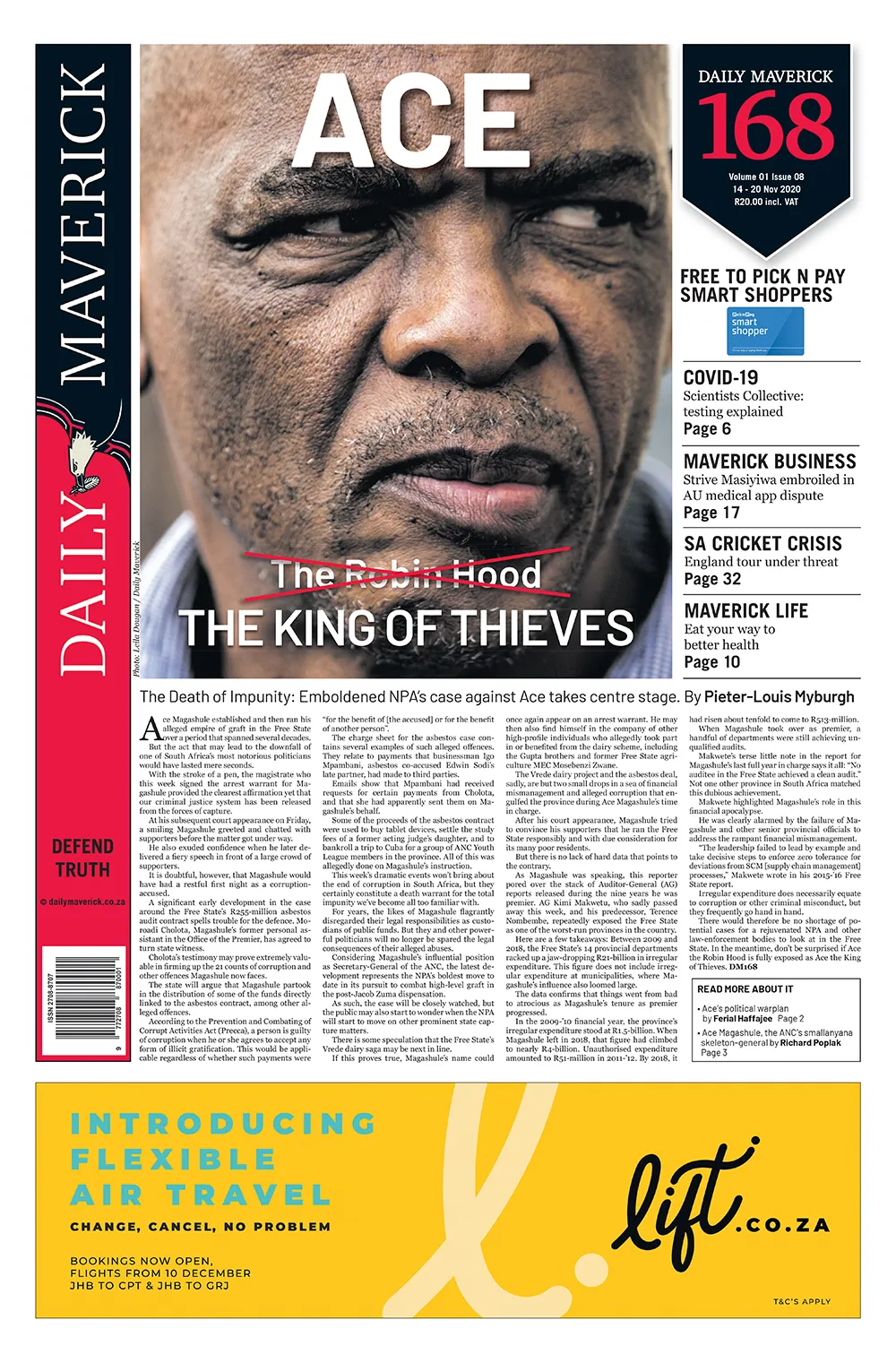









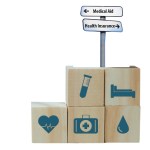










 Become an Insider
Become an Insider
Comments - Please login in order to comment.